It is extremely important to recognize the Ukrainian media not only as a means of covering the events of the war but also as a separate industry that needs support. This issue was discussed at the round table titled Constant Support Of The Ukrainian Media: Why It Is Important During The War? held on June 12 in Brussels by the National Union of Journalists of Ukraine (NUJU) and the European Federation of Journalists (EFJ)
The participants in the round table were the Director of the EFJ, Renate Schroeder; the Secretary General of the Belgian Association of Journalists (AGJPB-AJP)/member of the Executive Committee of the EFJ, Martine Simonis; the First Secretary of the NUJU, Lina Kushch; the Director of the Department of Information Policy and Information Security of the Ministry of Culture and Information Policy of Ukraine, Hanna Krasnostup; representative of the U.S. Committee to Protect Journalists (CPJ) in the EU and lead advocate, Tom Gibson; co-coordinator of the Kharkiv Journalists’ Solidarity Center (JSC), Hanna Chernenko; and a journalist from Kherson, Valentyna Fedorchuk.
A short planning horizon leads to a reduction in the number of jobs for journalists
“For more than two years now, Ukrainian journalists have been performing their work in extreme conditions of physical danger and economic crisis,” said Martine Simonis. “We often speak about physical danger for journalists, but we don’t speak a lot on the economical situation the media face in Ukraine. And the media industry in Ukraine lacks a financial basis for recovery due to several factors: lack of traditional source of income, destruction of advertising markets, and migration of the population. So, this has an effect on the subscriptions, lack of institutional media support program.”
Martine Simonis noted that international organizations, including the Emergency Fund, created by the European and International Federations of Journalists, and unions and associations of journalists in European countries, supported Ukrainian journalists in the most critical period. With international partners, the NUJU helped more than 4,500 journalists and restored the publishing of 30 newspapers.
“However, a short planning horizon leads to a reduction in the number of jobs for journalists and the formation of news deserts,” said Martine Simonis. “International journalism has a great influence on increasing the transparency and accountability of the authorities, which is especially important in the condition when international donors send significant funds to Ukraine for reconstruction. However, the recovery program presented by the Ukrainian government and the governments of the European countries does not provide for the recovery of the media.”
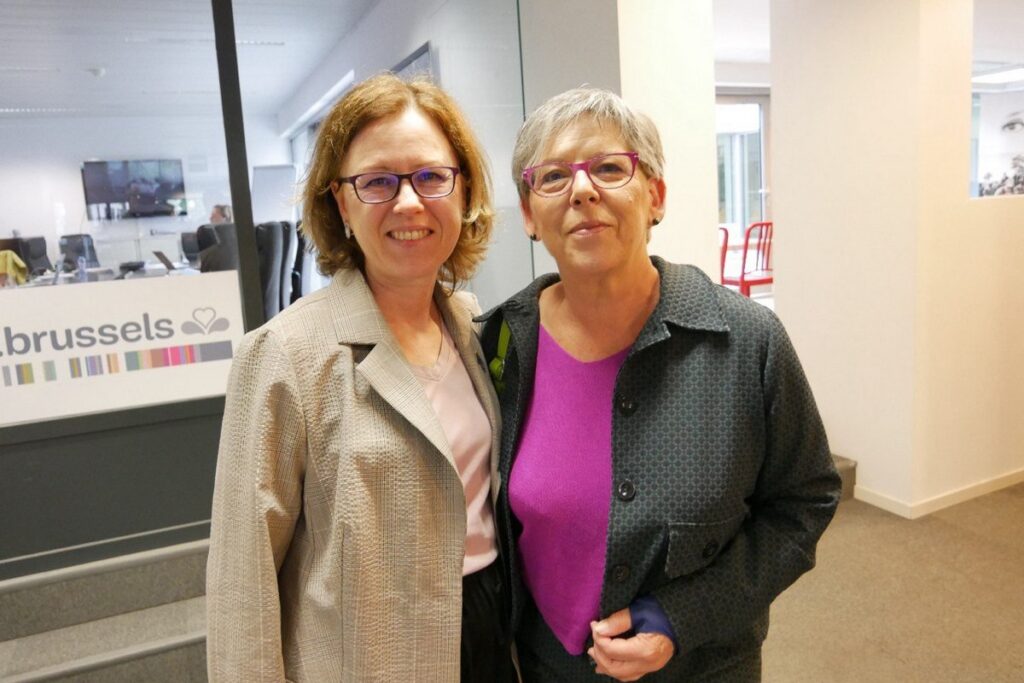
Martine Simonis emphasized that the Belgian Association of Journalists, together with the EFJ, call for the introduction of long-term support for Ukrainian mass media within the framework of the recovery plan for Ukraine and a transparent and fair mechanism for the distribution of financial support for newsrooms.
The Director of the EFJ, Renate Schroeder, recalled that the motto of the EFJ is Journalism Is A Public Good. In Europe in recent years, there has been a clearer awareness that journalism is indeed a public good. Journalism’s tasks are growing, and so are the challenges. For example, the EU faces an increasing number of “news deserts” – territories where there is no local journalism. Renate Schroeder noted that she understands the problems that Ukrainian society may face in the event of the disappearance of journalism both at the local and national levels.
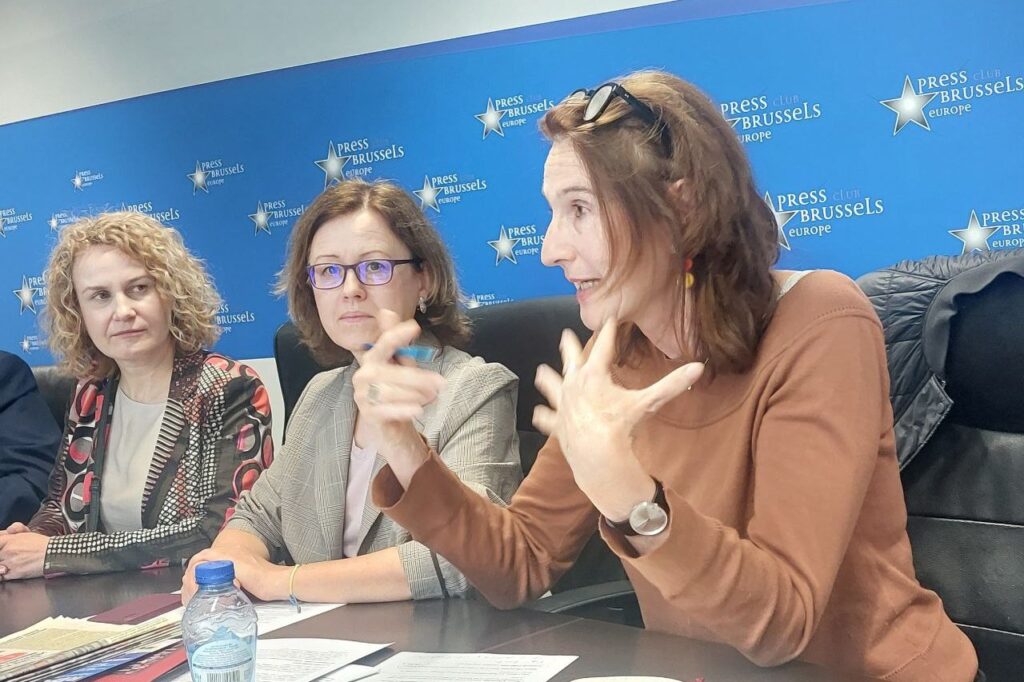
“When we talk about recovery, I mean, we know it from all the wars in the past, how destructive it can be. So thank you to everybody,” said Renate Schroeder. “And we hope very much this war will end. But at the same time, as we rightly say, we have to prepare that it will still stay and see how to how to be resilient indeed.”
Renate Schroeder expressed her gratitude for NUJU First Secretary Lina Kushch‘s participation in the round table.
“She is here at the moment as part of the International Training Program (ITP) on media development and democratic media regulation in a new digital area. It’s an important training program. And I think it’s also important to, sort of, get to the European standards that are so needed. But we all know, without funding, there is no media,” she said.
Include restoration of Ukrainian media into all plans and programs for Ukraine
In turn, Lina Kushch noted that she was moved by the sign of solidarity with Ukrainian journalists – the inscription on the facade of the Brussels building where the round table was held: We Are Kyiv Press Club.
“We see that we should be prepared for a long war, and we should be strengthened, including Ukrainian media,” Lina Kushch said. “At the same time, Ukrainian media and Ukrainian journalists suffered from the war because their buildings were destroyed. Over 20 percent of Ukrainian media and newsrooms lost their access to their premises, to their technique because of hostilities and occupation.”
She said that our brave colleagues continue to work. She also showed the newspapers that are still issued in the front-line territories. She drew particular attention to the Vpered newspaper, which is published for the residents of the ruined and russian-occupied town of Bakhmut.
“This newspaper is issued and shared a couple of kilometers from the russian border and the Donetsk Region. This is the newspaper from Bakhmut. And now, the journalists have moved to safe places, but they continue their work for people. They moved from Bakhmut and they are located in different Ukrainian cities. And the newspaper is a sign of the community. It’s important for the community of this city,” the First Secretary said.
Some publications, such as the Kherson-based Novyi Den newspaper, still have sources of information in the occupied territories, but must carefully conceal them.
Lina Kushch once again emphasized that Ukrainian journalists work in conditions of lack of funds due to the lack of income from advertising and other income. At the same time, the plans for the recovery of Ukraine do not contain any components regarding the revival of Ukrainian media, especially local ones.
Lina Kushch recalled that simultaneously with the Brussels round table, a large conference on the restoration of Ukraine was held in Berlin. In addition, more than 100 Ukrainian journalists and representatives of non-governmental organizations are participating in the International Training Program.
“Our foreign partners signed the statement we call to include the issues of recovery Ukrainian media in the Ukrainian recovery conference in Berlin and all plans and programs for Ukraine from foreign donors and a Ukrainian government. It’s crucially important to recognize Ukrainian media not as an object only that journalists have to cover everything that happened and to have to cover the process of recovery. But like subjects who need support, like sector that need support from this program,” said Lina Kushch.
She confirmed that the help of international partners allows Ukrainian journalists to continue their work in hard conditions and asked to focus on the long-term support of Ukrainian media, long term support of Ukrainian journalists because of the perspectives of this war and to push, including these issues in all agendas, of all international conferences, meetings, and recovery plans for Ukraine.
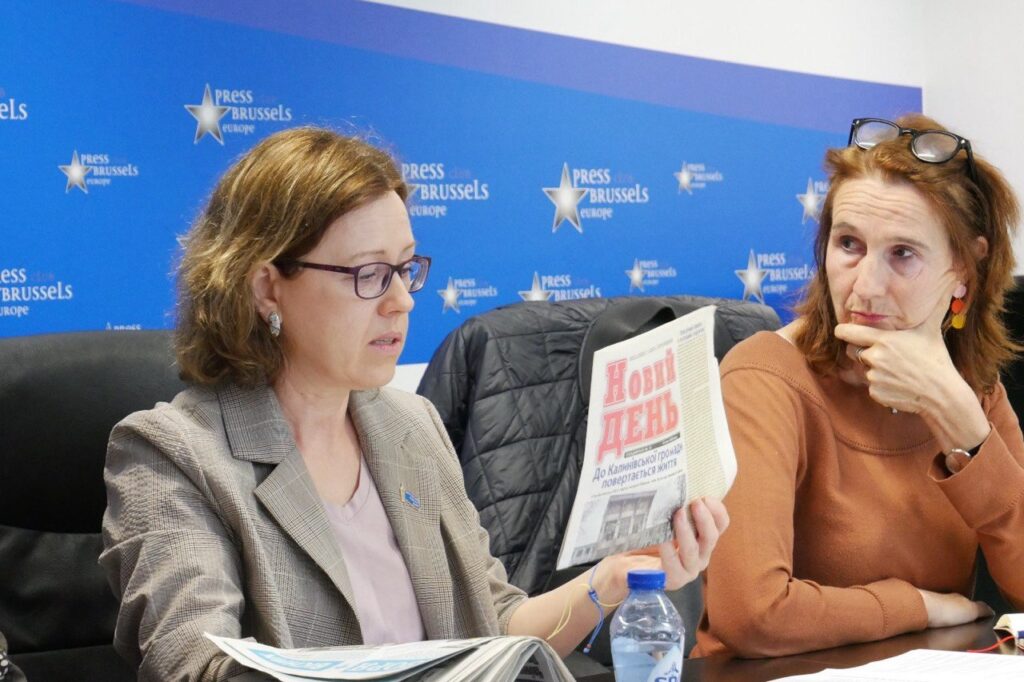
Journalists Matter!
The Director of the Department of Information Policy and Information Security of the Ministry of Culture and Information Policy of Ukraine, Hanna Krasnostup, talked about the implementation of the state information policy.
“We change our legislation on media. We work with the Digital Services Act (DSA) and we would like to implement its acts,” said Hanna Krasnostup. “We try to create safe conditions for the work of journalists, not only Ukrainian but foreign ones too.”
She also thanked international partners for their support and noted that “we’re still alive because of your support.”
“The focal point of our campaign is Journalists Matter. It is a big one for me. And together with my colleagues from the National Union of Journalists of Ukraine, media experts, and different representatives of state authorities, we create a coordination committee for this campaign, Journalists Matter. It is not only physical safety but also economic issues. We try to protect them. It’s also gender violence. A lot of bad things happened in Ukraine during the war, especially we should protect women journalists because of military crimes against them,” she said.
The “Journalists Matter” campaign disseminates recommendations for the media regarding informing the public about cases of sexual violence. In particular, advice on how to take comments from affected women and their relatives so as not to negatively affect their psychological state.
Another important direction of the campaign is to work on the liberation of civilian prisoners from russian captivity, including journalists, studying the fate of media workers who are in the occupied territories.
Hanna Krasnostup noted that the Ukrainian authorities are trying to involve the media in the information exchange regarding tools and mechanisms for combating Kremlin propaganda and disinformation.
According to the official, cooperation in the field of protection of journalists with international partners is a priority.
“We, together with the National Union of Journalists of Ukraine try to involve in our project “Recovery Window.” It’s a project about sector journalists about support for media during the war and after martial law,” Hanna Krasnostup said.
“Right now, our Minister of Cultural Information Policy prepared a draft or roadmap about creating pluralistic, independent media and stay after martial law. And we include some provisions about state support because we try to try some funds on the state budget, but it is not enough for them. I strongly believe that recovery of journalists and the information sphere of media outlets will give us the opportunity to create and rebuild our information landscape, especially in the regions after liberating,” she said.
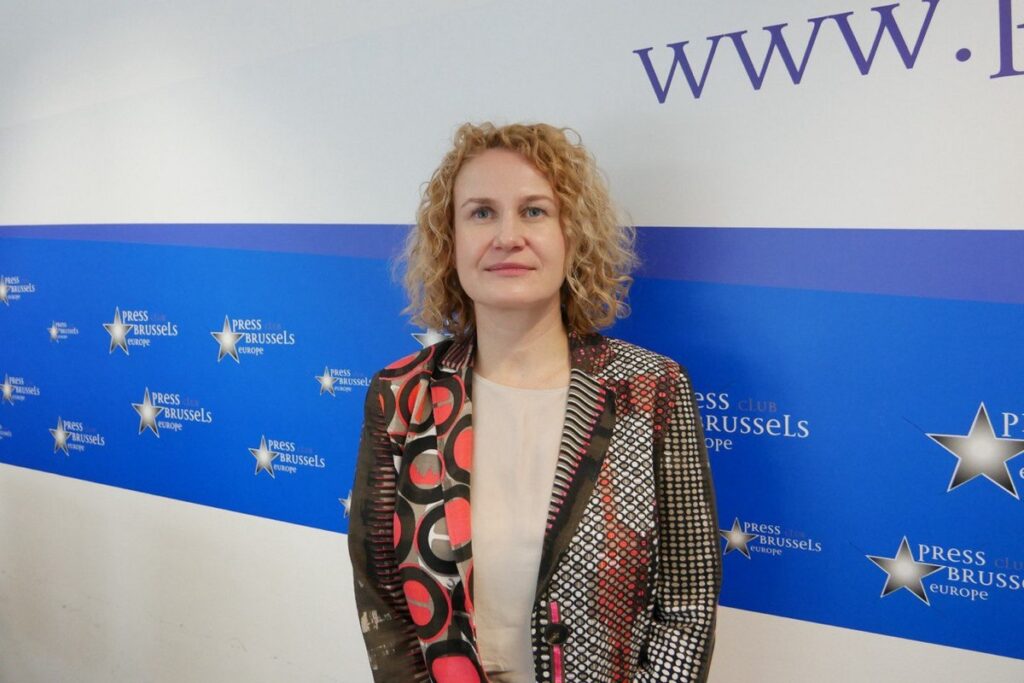
The conflict raised the question of the role of journalists during the war
Representative of the U.S. Committee to Protect Journalists (CPJ) in the EU and lead advocate Tom Gibson spoke about the fact that the sustainable development of the media should be at the center of attention because, without it, society cannot exist and resist violence and repression. In his opinion, support for the protection of freedom of speech in Ukraine is currently relevant not only for Ukrainian human rights defenders but also, in view of the process of Ukraine’s accession to the EU and for their like-minded European people. In recent years, according to Tom Gibson, there has been progress around the world in matters of the rule of law, especially in relation to media freedom.
“I think the conflict has actually, again, raised this sort of broader question about the role of journalists during times of war,” he said. “But you know, I think some of the work that we’ve done, I mean, you guys, I think know what the challenges are for a number of journalists that you know they’re dealing with physical exhaustion and fatigue psychological toll of the war. And that you know we have infrastructure problems cuts and electricity spying internet, you know, journalists have just been woken up by sirens having to be in a fine shelter during a bombing, etc. The needs of these structural issues that, you know, I think some of us within the press freedom community have been responding to. And, you know, we have tried to be as responsible as we can with our emergency assistance due to journalists when they’re coming to us for advice, for example. I mean saying that we did also see this sort of spike of killings at the start of the conflict.”
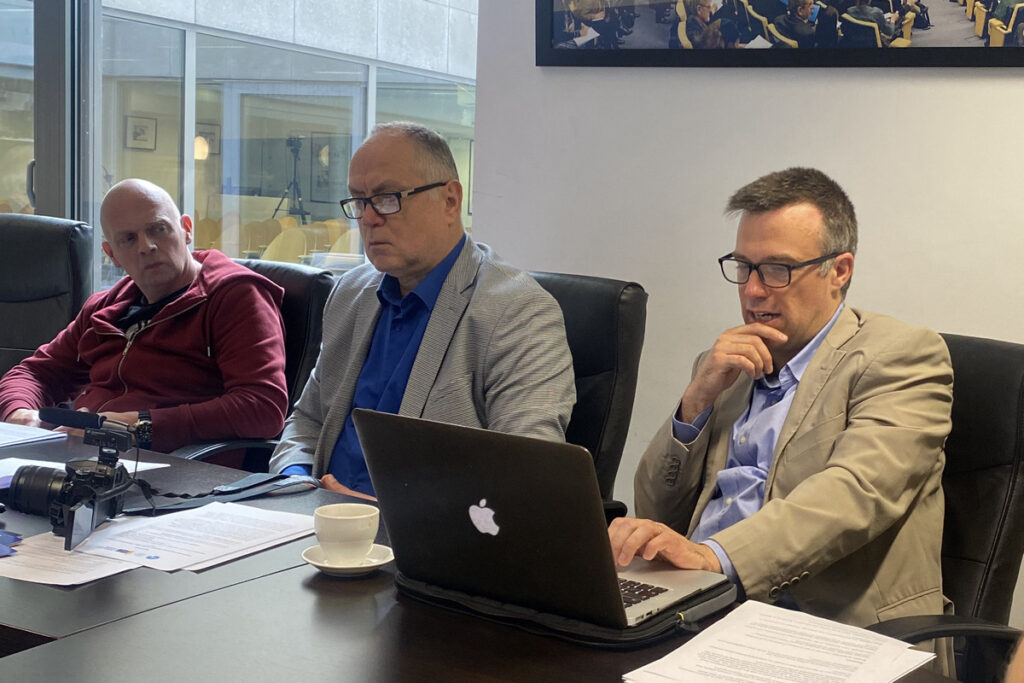
At the same time, Tom Gibson noted the other side of the problems of journalists in Ukraine – restrictions on travel to the front line and complex accreditation rules. He emphasized the importance of media stability in the space in which journalists work – freedom of speech, security of activity, etc.
He also emphasized the importance of talking about media sustainability in the long term.
The air alert ended recently, but Kharkiv is never safe
The Journalist from Kharkiv/coordinator of the NUJU‘s Journalists’ Solidarity Center there, Hanna Chernenko, talked about the work of Ukrainian journalists in the front-line territories.
“Ukrainian, Kharkiv journalists, in particular, go to work at the front line, and I do as well,” she said. “It’s dangerous, but we have to do it. Now, I am in Kharkiv. We just recently ended an air alert, but this is never safe. The city can be sheltered right now, and I will go to film it. I will hope that there will not be a second strike. My colleague came under such a drone attack in the spring. Being a journalist in a front-line city means being at work every second. You live and work in war.”
According to Hanna Chernenko, it is both mentally and physically difficult.
“On June 10, we stood for two hours and waited for an old man to be taken out from under the rubble. I am really worried about him. He was found alive, but in the morning, he died in hospital,” the journalist said.
She noted that every media person working at war will bear memories of these events for the rest of their life.
“I filmed the consequence of a rocket attack on a high-rise building in Kharkiv. I found a turn-off hand. I called the police,” Hanna said. “The man, an ambulance driver, was on his way to work in the morning. He was near the center of a missile strike. It was his arm which was turned off. The Russian military did it. And this is not the worst thing I have seen. On May 25, Kharkiv was hit four times. Several dozens of journalists were walking near the Epicenter, the hypermarket, where 19 people and two children died. A colleague of mine broke his arm when we were there. Several times we were forced to run and fall to the ground because there was a new alarm and a zed of glow. This is our reality. Beautiful villages near Kharkiv are like ruins. When you return from a destroyed village, you just want to cry.”
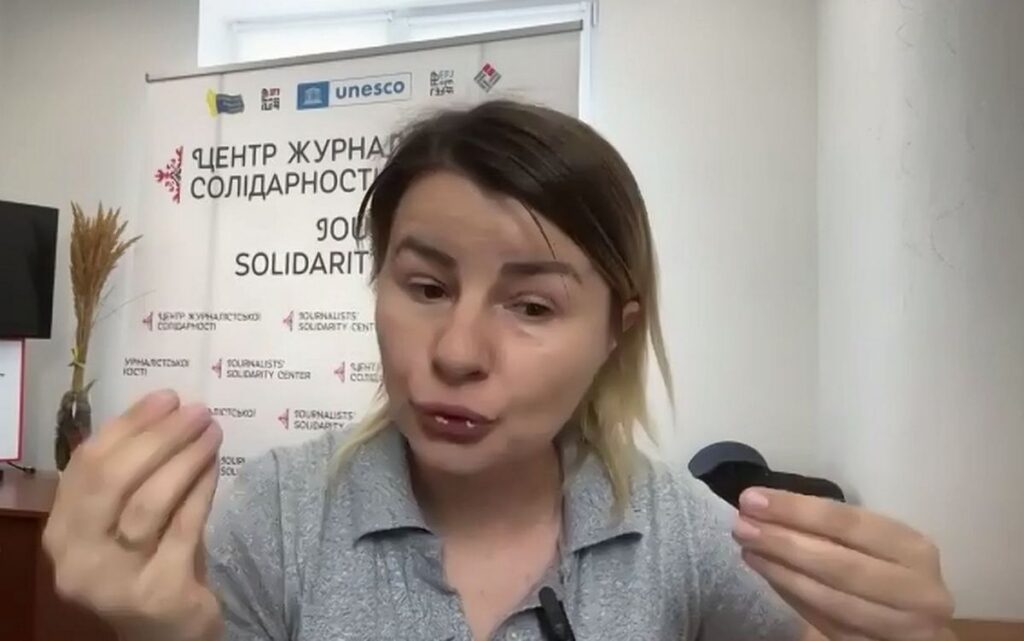
Because of the war, there was less media in the Kharkiv Region. Television projects and websites are being closed. And in May, the world-famous printing house burned down. Editors print newspapers at their own expense and deliver them to subscribers under fire. The main explanation for such stubbornness is that the media want to work. They learn and go to work online. Editors work as operators, directors, administrators, and journalists at the same time.
“I want to say that Ukrainian journalists are heroes. They often do the impossible for the sake of truth. So, I want to thank everyone who supports the media. Thanks for supporting the Journalists’ Solidarity Center in Kharkiv and Ukraine. This is too important way of support. We give a bold truth, first aid kids, to those who go to the front line. When in Kharkiv there is no electric light, our colleagues come to us to work. They just come to us to talk. It’s important and must not be alone during the war.”
“Journalists in the front-line territories are focused on surviving, and we pass a lot of medical training sessions on how to help,” Hanna Chernenko said. “Among our professional problems, Ukrainian journalists have own problems – personal ones or when you have different levels of distraction. My colleagues and I, in the past, had mental difficulties. We try to cope with that. We find the information about self-help. Or we have a meeting with each other and a psychologist or individual or collective meeting with psychologists. It works. The worst thing for me and my colleagues is to work or to talk with people who lost their relatives in their eyes. And it will stay on my mind for the future. Now, unfortunately, I have no time to work with this visit.”
She did not accept the idea of the existence of considerable bureaucratic obstacles in the way of journalists’ work along the front line.
“There are no problems when you speak with Ukrainian soldiers, but the only issue is that it should be a safe place for journalists to go at the front line because otherwise you cannot go,” she said. “Sometimes it’s disinformation that says that the Ukrainian journalists cannot go to the front line, it’s completely allowed but only if you have proper preparation, but sometimes the other trips to the front line are postponed just because of the security reasons. When I was working in Chasiv Yar in the Donetsk Region, it was under shelling now, so we unfortunately couldn’t get there. But we could talk to our soldiers. And in Vovchansk in the Kharkiv Region, journalists could work until the end of street fighting started.”
Probably we should be a little more open, but I think we are already very open. And the conditions that we have are often characterized as the most accessible compared to any other war that has occurred in recent times.
Hanna Chernenko emphasized the global importance of Ukrainian local journalists:
“They can prepare high-quality, in-depth news about the situation in Ukraine and show it to the international community.
In turn, the journalist from Kherson, Valentyna Fedorchuk, talks about how Ukrainian journalists had to become war correspondents.
“When the war started, we had no choice. The war came to us by itself. Today, my colleagues and I have to work in conditions of constant danger and shelling. The Kherson Region suffers from occupation, flooding, and daily shelling. And in all these conditions, journalists continued to work. For russians, the inscription PRESS on body armor is a red target, and there are even places where it is safer for journalists to be without protection,” Valentyna Fedorchuk said. “But when you go to work at the place of shelling, there is always a high probability of coming under repeated enemy fire. Those journalists who remain in the front-line regions need special attention and support.”
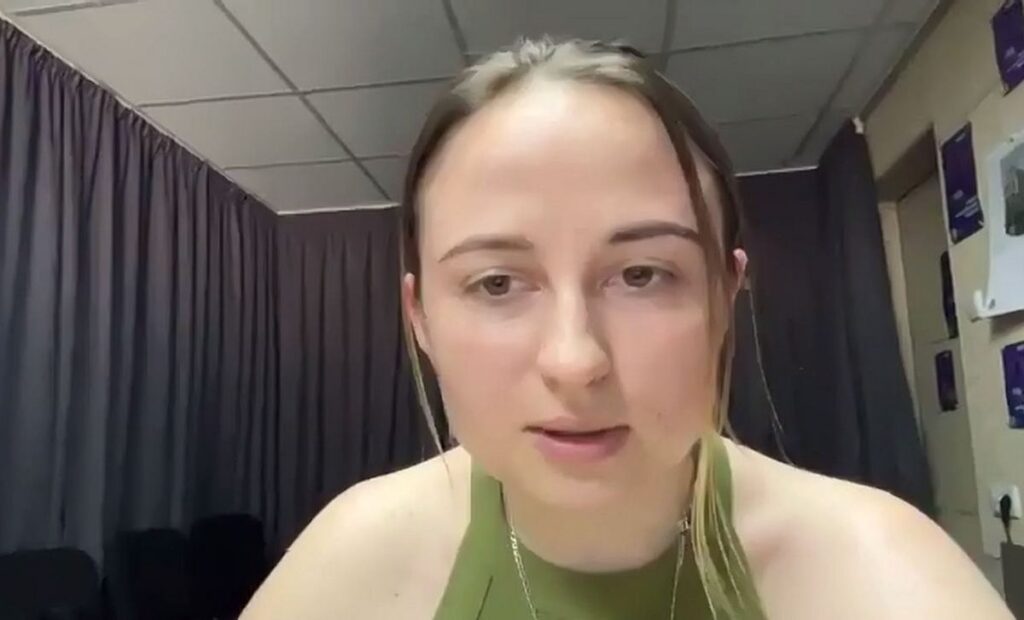
“In the temporarily occupied territories, the russians cut off Ukrainians from information and television and threatened people for reading Ukrainian telegram channels. And at this time, they filled the information space with their disinformation. That’s why now we must find ways to confront the enemy in this information war,” the journalist said.
In her words, “this is the question for all world, not only for Kherson, Kharkiv or other parts of Ukraine.” Her thoughts were supported by Renate Schroeder, who added that the influence of russian disinformation can be clearly seen during the elections in the EU, United States, and other parts of the world.
Summarizing the work of the round table, Lina Kushch noted that there is a growing public demand in the world for verified information from and about Ukraine, for local information. But the only way to get this information is to support professional journalists and Ukrainian media.
And Renate Schroeder concluded the event with the words: “Long live local journalism.”
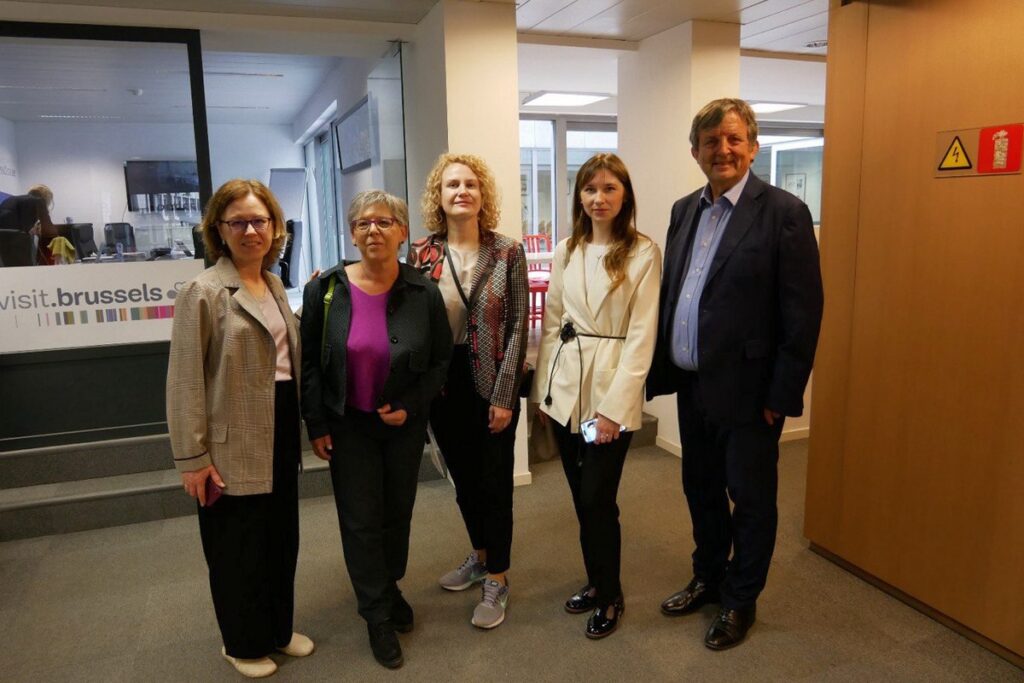
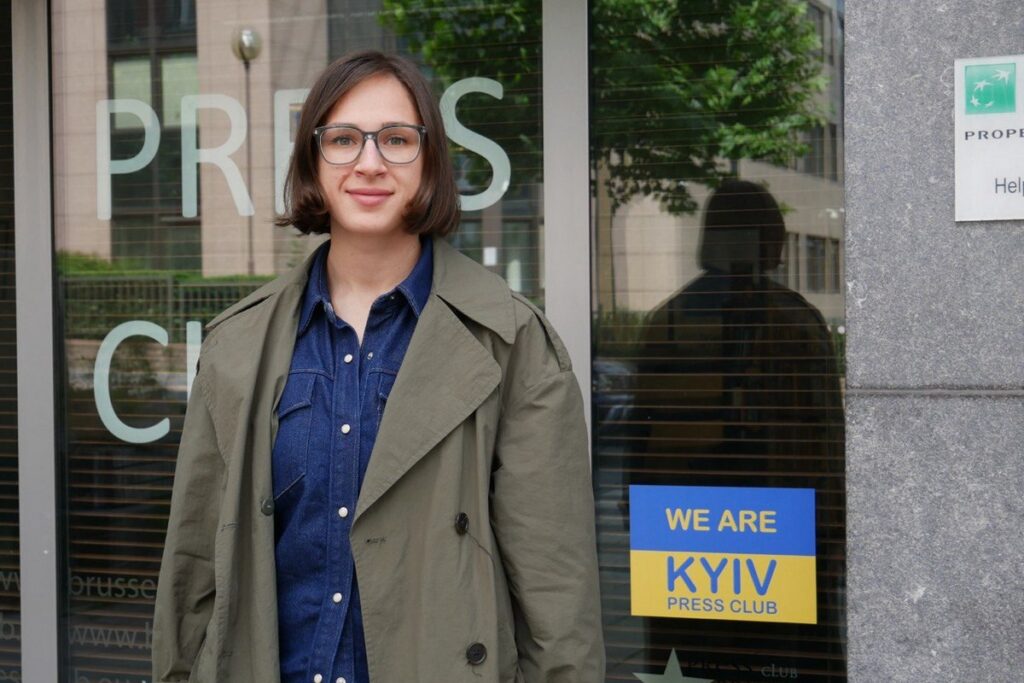
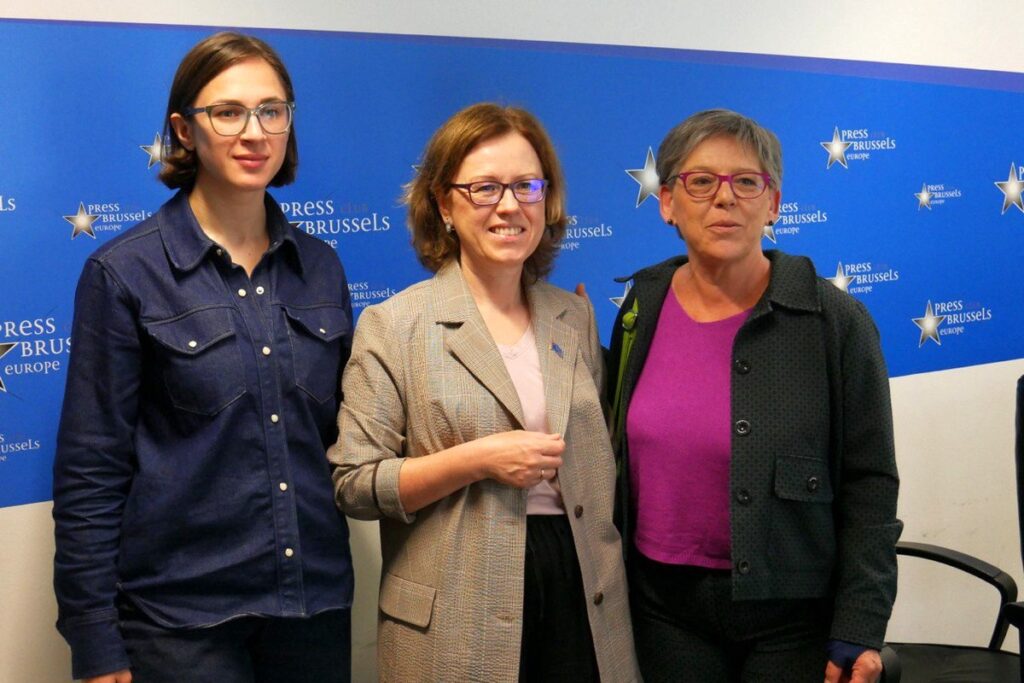
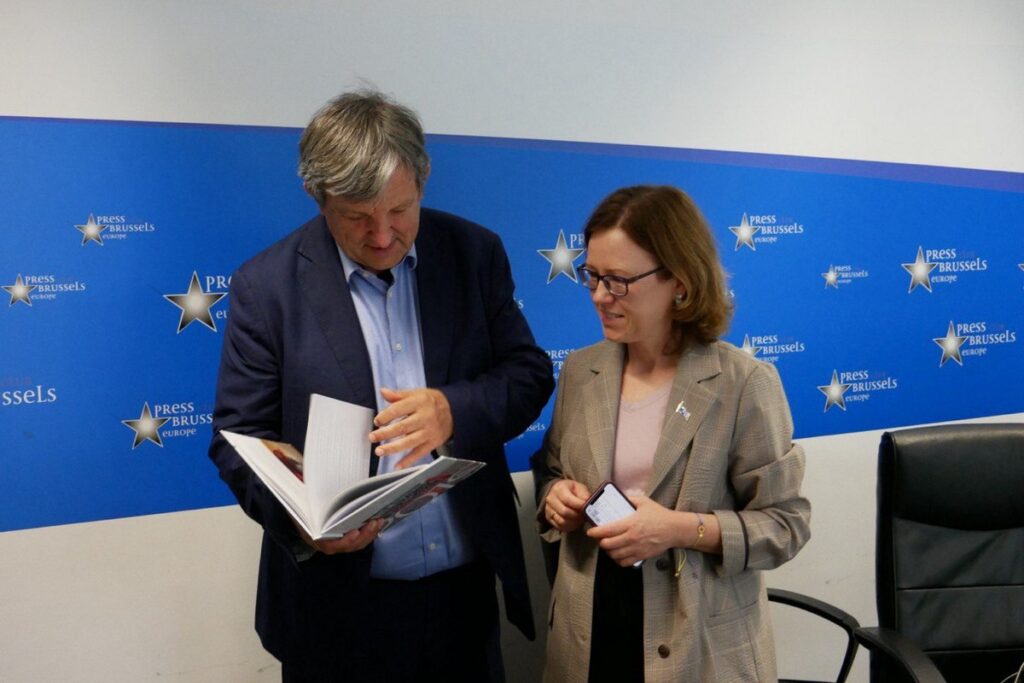
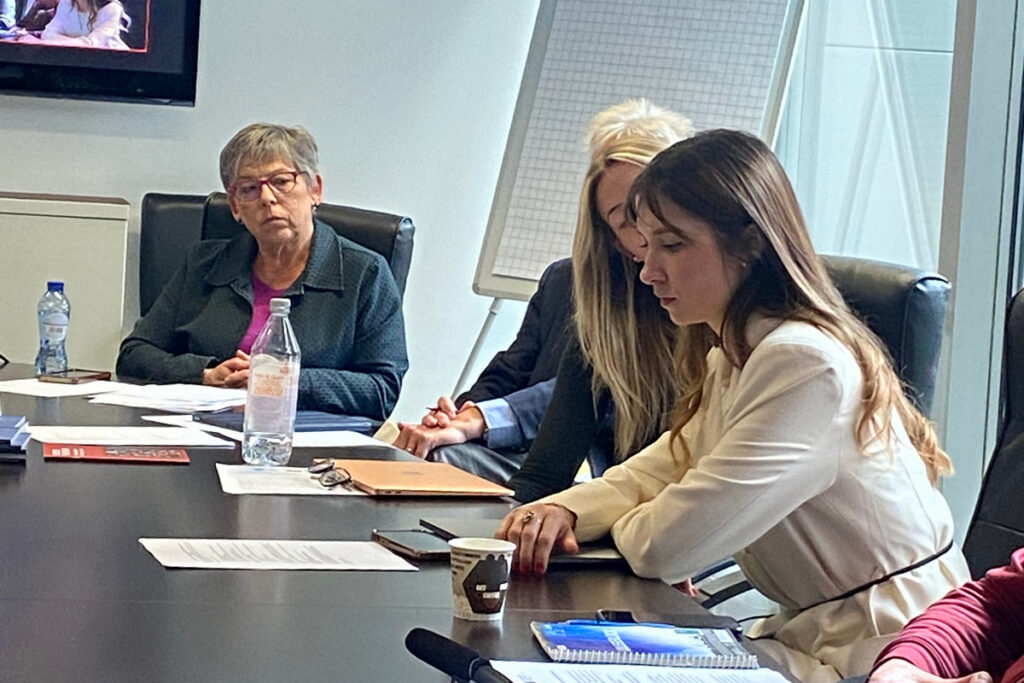
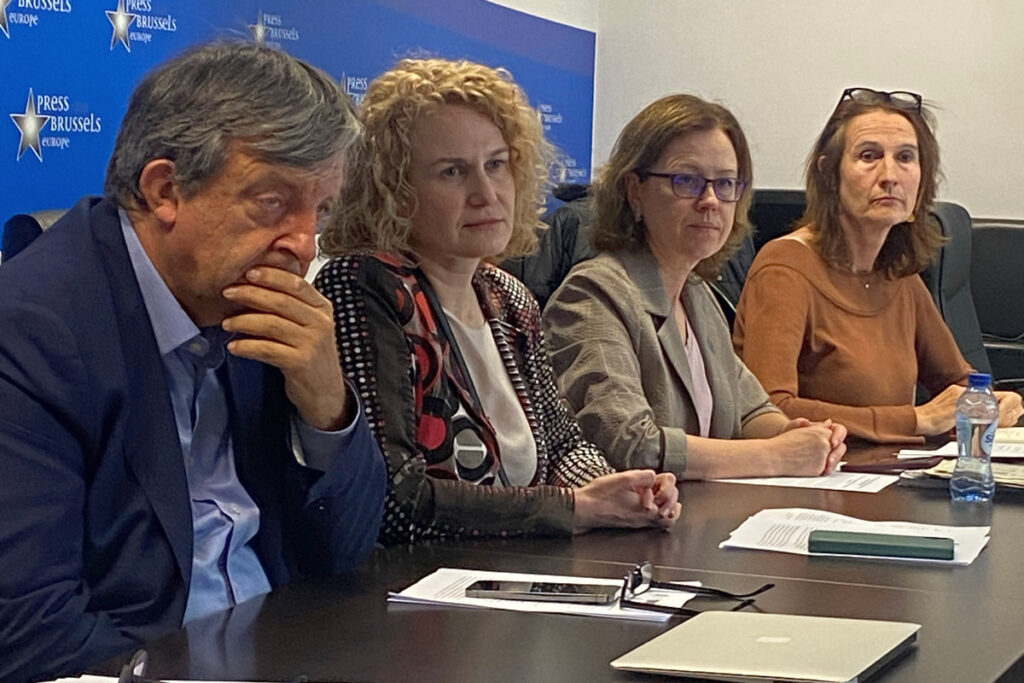
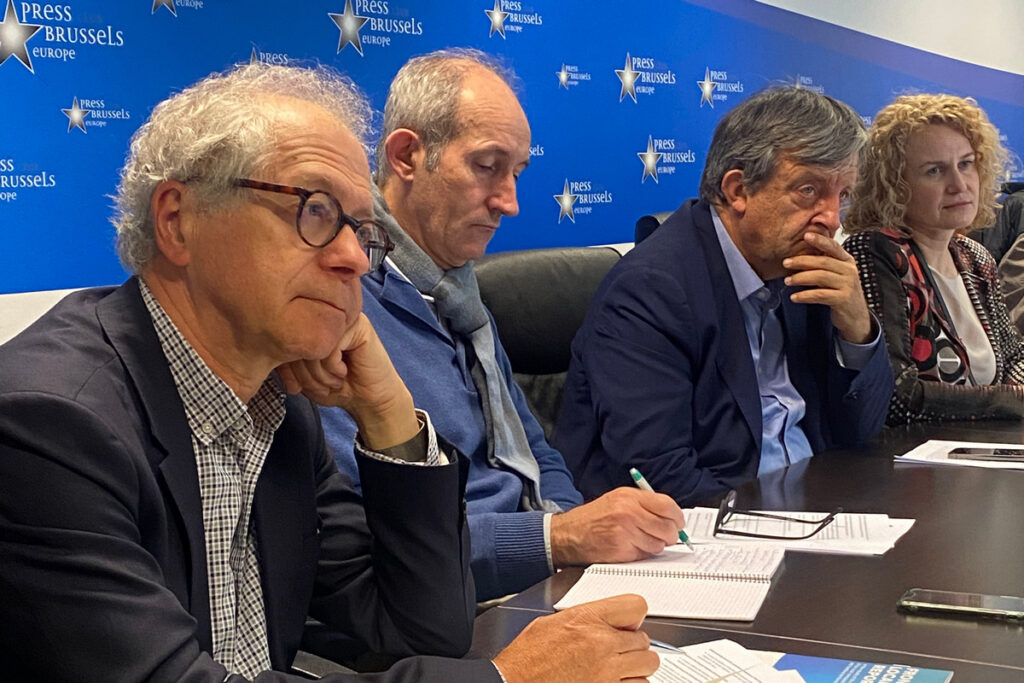
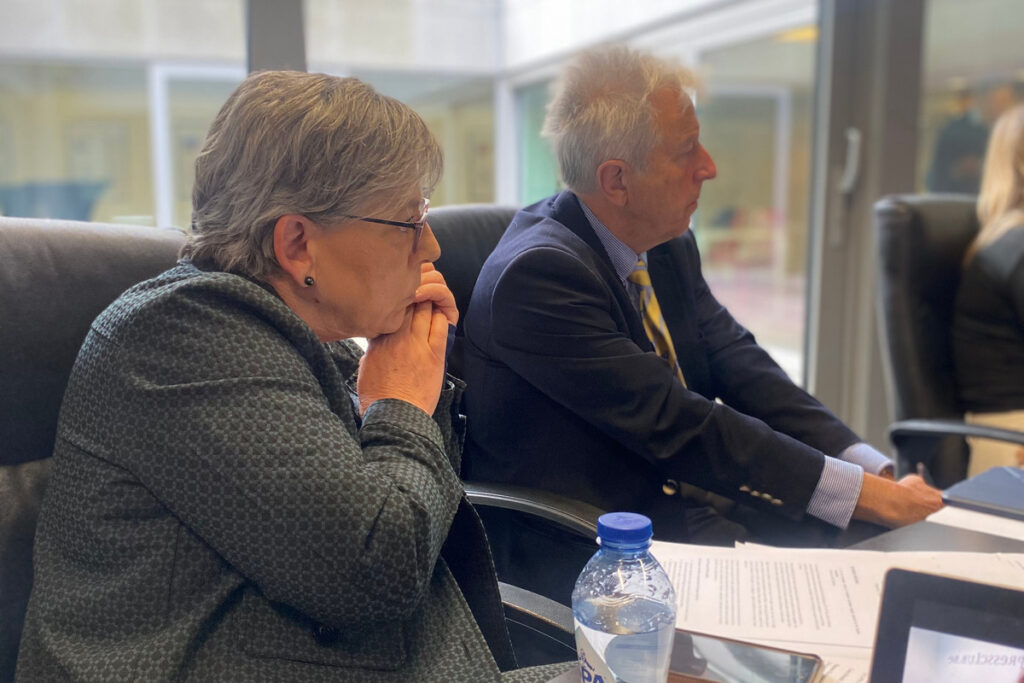
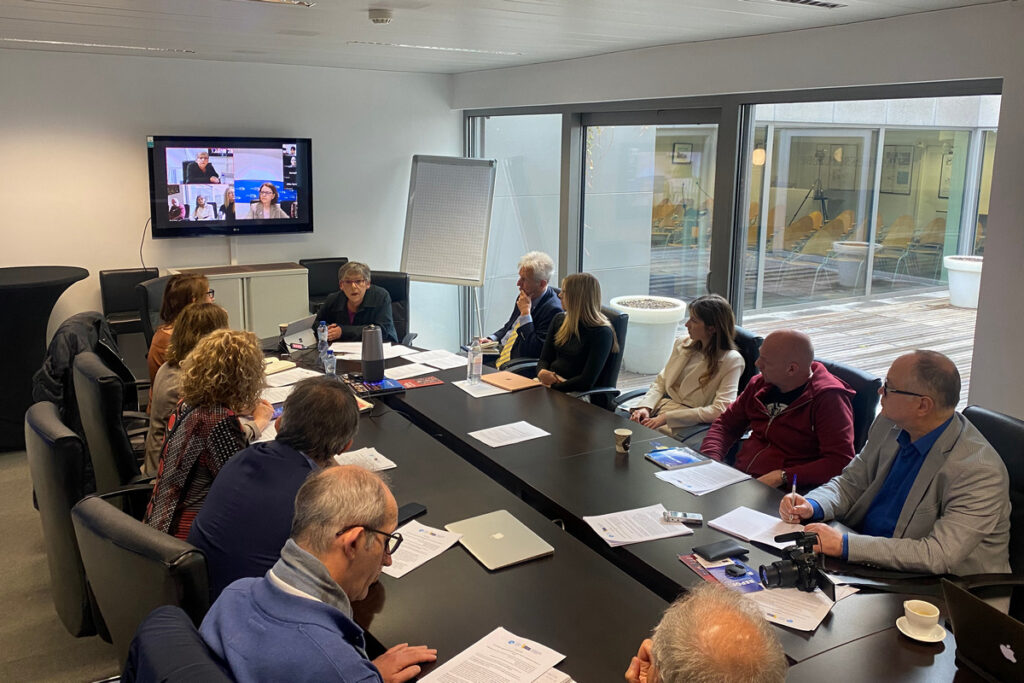
Address of the European Federation of Journalists
On the importance of restoring the media as an integral part of the restoration of Ukraine
Ukrainian independent media play a critical role as reliable sources of information in conditions of large-scale war. For more than two years, Ukrainian journalists have been performing their work in extreme conditions of physical danger and economic crisis.
The Ukrainian media industry lacks a financial basis for recovery due to several factors:
1) lack of traditional sources of income: the decline in the advertising market in the regions, a narrowed market in the capital
2) migration of the population and a decrease in income from subscriptions;
3) loss of interest of big business in media preservation;
4) lack of institutional media support programs.
Because of this, most Ukrainian media suffer from the uncertainty of the future, financial problems and lack of personnel.
Aid from international organizations, including the Safety Fund, created by the European and International Federations of Journalists and thanks to contributions from unions and associations of journalists in European countries, supported Ukrainian journalists in the most critical period. With the support of international partners, the National Union of Journalists of Ukraine helped more than 4,500 journalists and more than 200 newsrooms; in particular, it restored the publication of 30 newspapers in the front-line territories.
However, a short planning horizon leads to the reduction of jobs for journalists and the formation of “news deserts.” These gaps are filled by destructive Russian propaganda and unverified and anonymous sources of information, which increases the audience’s sensitivity to misinformation.
These problems are raised by the White Paper developed by the Global Forum for Media Development (GFMD) coalition in 2023 where a significant part of the proposals of the National Union of Journalists of Ukraine was taken into account.
Professional journalism has a great influence on increasing the transparency and accountability of the authorities, which is especially important in the conditions when international donors send significant funds to Ukraine for reconstruction.
However, the recovery programs presented by the Ukrainian government and the governments of European countries do not provide for the recovery of the media. This creates a situation where the public in the affected regions does not have the opportunity to control the spending of funds on infrastructure renewal – due to the closure of the media in these regions.
The Congress of the EFJ calls on donors to develop long-term support programs for Ukrainian media and make such programs part of Ukraine’s recovery plans.
The Congress instructs the Executive Committee of the EFJ:
- to turn to the European Commission with a proposal to consider the issue of long-term support for Ukrainian media as part of Ukraine’s recovery plan;
- to appeal to the governments of the countries of the European Union with a call to include media restoration as a separate direction in the assistance programs for the restoration of Ukraine;
- to consider the possibility of transferring part of the confiscated assets of the Russian Federation for long-term support of Ukrainian media and journalists who suffered as a result of armed aggression;
- to sign on behalf of the EFJ the White Paper ‘Long-term financial support for Ukrainian media and journalists,’ developed by GFMD with the participation of the NUJU.
Turn to the Government and the Parliament of Ukraine to call to:
- create an independent support fund for Ukrainian media as a transparent and fair mechanism for distributing financial support to newsrooms; to involve Ukrainian media organizations in the management of the Fund;
- provide tax and other forms of assistance to Ukrainian media to ease financial pressure in the conditions of war and the lack of traditional sources of funding.
Approved at the annual meeting of the EFJ in Pristina on May 23-24, 2024.
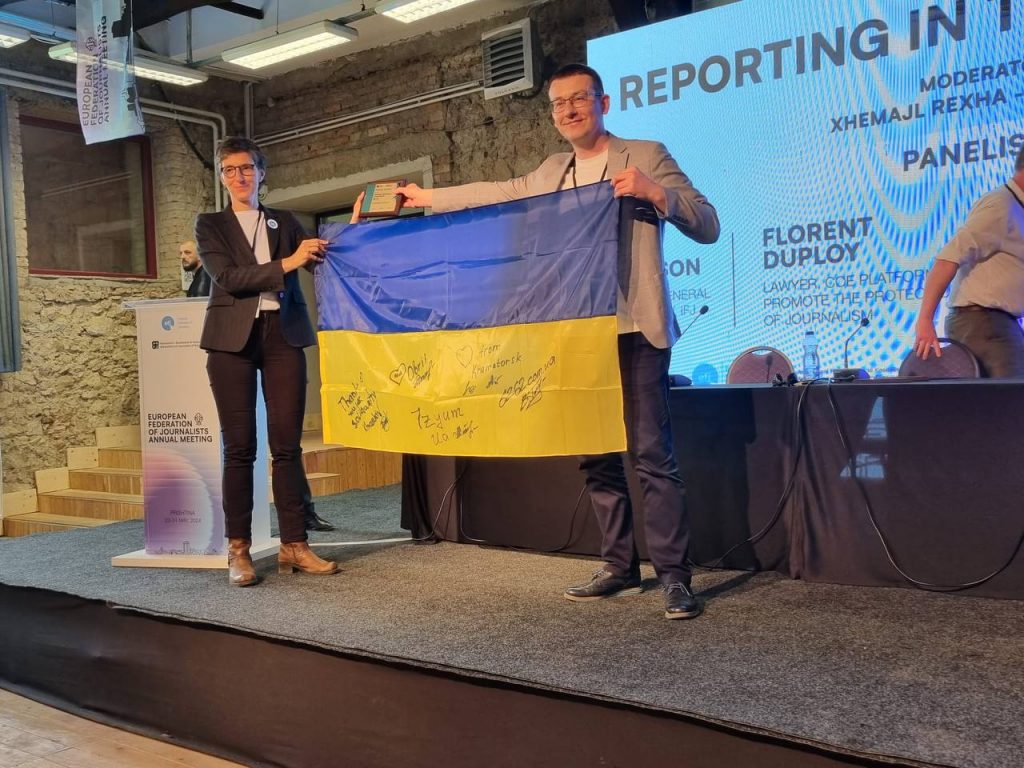
NUJU Information Service

 THE NATIONAL UNION OF
JOURNALISTS OF UKRAINE
THE NATIONAL UNION OF
JOURNALISTS OF UKRAINE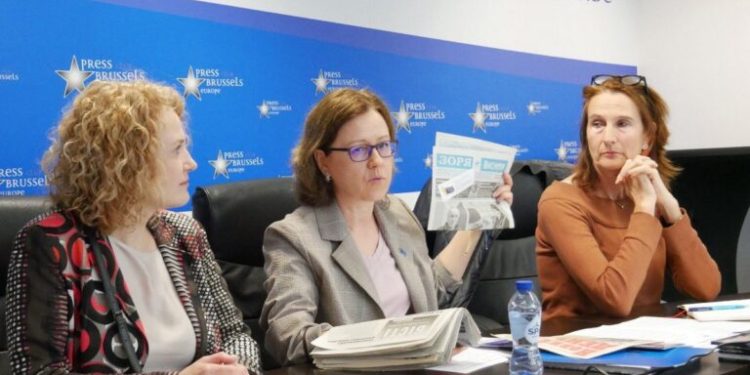
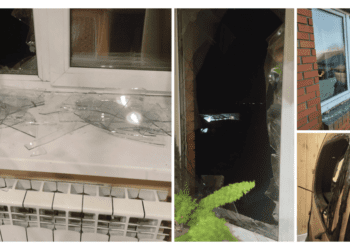
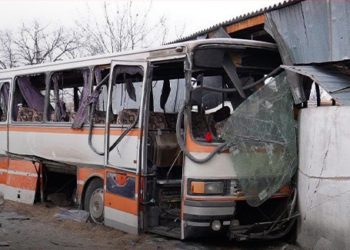














Discussion about this post